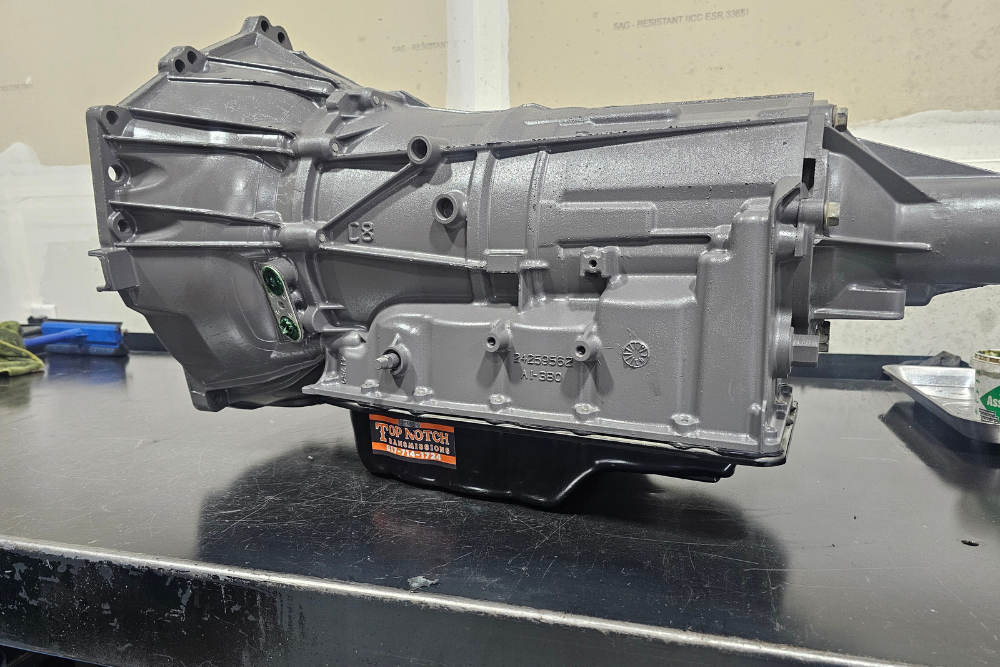
- Give Us A Call (817) 386-7592
- Get Directions
-
Financing Available

Your check engine light isn’t just there for engine problems—it can also alert you to transmission issues. At Top Notch Transmissions in Fort Worth, we help drivers decode what that light really means and fix the issue before it leads to serious damage.
When your check engine light comes on, it can be confusing—and a little stressful. Most people assume it has to do with the engine, but in many cases, the issue lies in the transmission. Modern vehicles are full of sensors and control modules that constantly monitor performance. If something in the transmission isn’t operating as it should, your vehicle’s computer (ECU) will trigger the check engine light to alert you.
Don’t ignore this warning. Transmission-related problems caught early are often much less expensive to repair than those left to worsen over time.
Yes, absolutely. In fact, many transmission-related problems don’t have their own separate warning light—instead, they’re flagged through the check engine light. That’s because the transmission is so closely connected to the engine, emissions system, and electronic controls.
The onboard diagnostics (OBD-II) system in your vehicle is designed to detect anything that affects performance, fuel efficiency, emissions, or drivability. When the computer notices abnormal readings from the transmission or its sensors, it stores a diagnostic trouble code (DTC) and triggers the check engine light.

1. Transmission Fluid Temperature Sensor Problems
If the fluid is overheating or the sensor is giving faulty readings, your transmission may shift poorly—or not at all. The system will detect this issue and illuminate the check engine light.
2. Torque Converter Problems
A malfunctioning torque converter affects how power is transferred from the engine to the transmission. If it’s slipping or not locking up properly, the computer will catch this irregularity.
3. Shift Solenoid Failures
Solenoids control fluid flow inside the transmission. If one fails or sticks, your car may shift erratically or get stuck in a single gear. This often triggers both poor driving performance and the check engine light.
4. Transmission Control Module (TCM) Malfunctions
The TCM controls when and how your transmission shifts. If it stops communicating with the engine control module or starts sending incorrect commands, you’ll likely see a warning light—and possibly experience gear engagement issues.
5. Speed or Position Sensor Failures
Your transmission uses multiple sensors to monitor vehicle speed, gear position, and input/output shaft speeds. Faulty sensors can cause miscommunication between the engine and transmission, triggering a check engine light and affecting drivability.
6. Slipping or Delayed Shifting
If your transmission is slipping, shifting hard, or taking too long to engage, the system will flag that abnormal behavior—even if it feels subtle to you.
Step 1: Don’t Panic—But Don’t Ignore It
A flashing check engine light means the issue is urgent. A solid light means something is wrong, but your car may still be drivable—for now. Either way, it needs to be checked soon.
Step 2: Note Any Other Symptoms
Are you hearing strange noises? Feeling delayed or rough shifting? Noticing poor fuel economy? These symptoms can help your technician pinpoint the issue more quickly.
Step 3: Get a Diagnostic Scan
At Top Notch Transmissions, we use advanced diagnostic tools to scan your vehicle’s computer and read any trouble codes stored in the system. These codes tell us which components are malfunctioning or outside their normal range.
Step 4: Let a Specialist Inspect Your Transmission
Reading the codes is just the beginning. We perform a complete transmission inspection—including checking fluid condition, electronic controls, and mechanical components—to accurately identify the problem and recommend the right repair.
The longer a transmission problem goes unaddressed, the more damage it can cause. What might start as a faulty solenoid or low fluid level can escalate into burned-out clutches, a damaged valve body, or even complete transmission failure.
Catching and fixing transmission-related check engine codes early can:
At Top Notch Transmissions, we believe in honest, transparent service. We’ll explain exactly what triggered your check engine light, how serious it is, and what it will take to fix it—so you’re never left guessing.
If your check engine light is on and you’re experiencing shifting problems, strange noises, or poor performance, it’s time to get your transmission checked. Our Fort Worth team has the tools, training, and experience to find the issue and get it fixed right the first time.
Call Top Notch Transmissions today to schedule your transmission diagnostic and stop that check engine light from becoming a major transmission repair.
